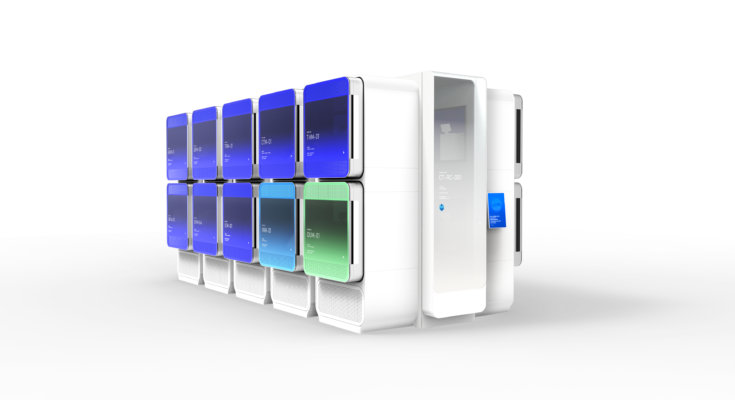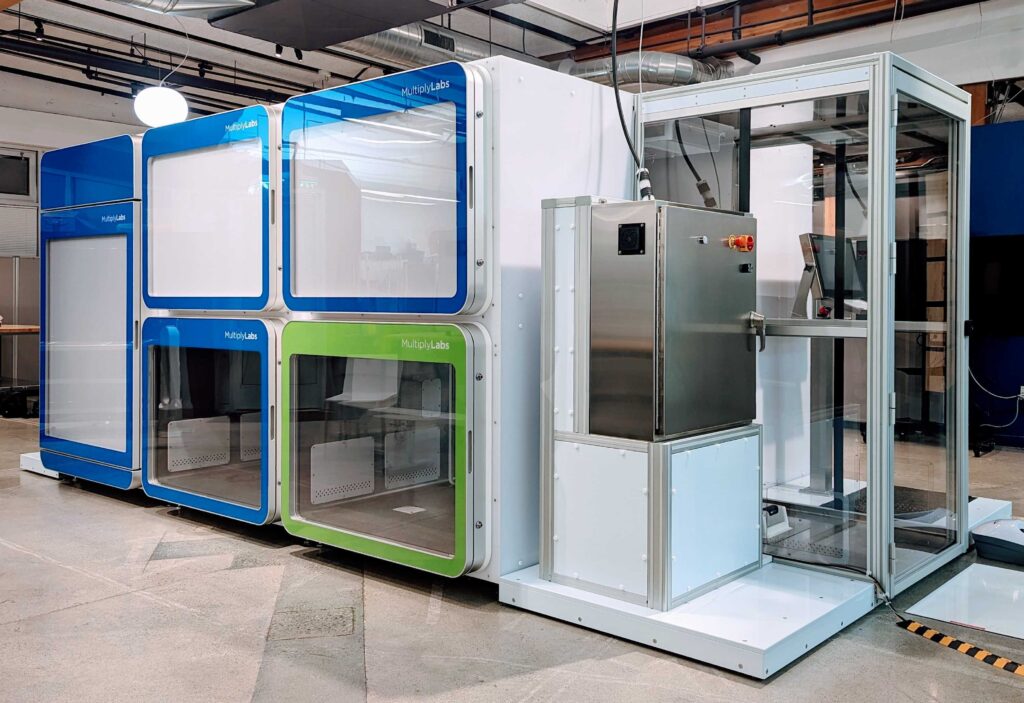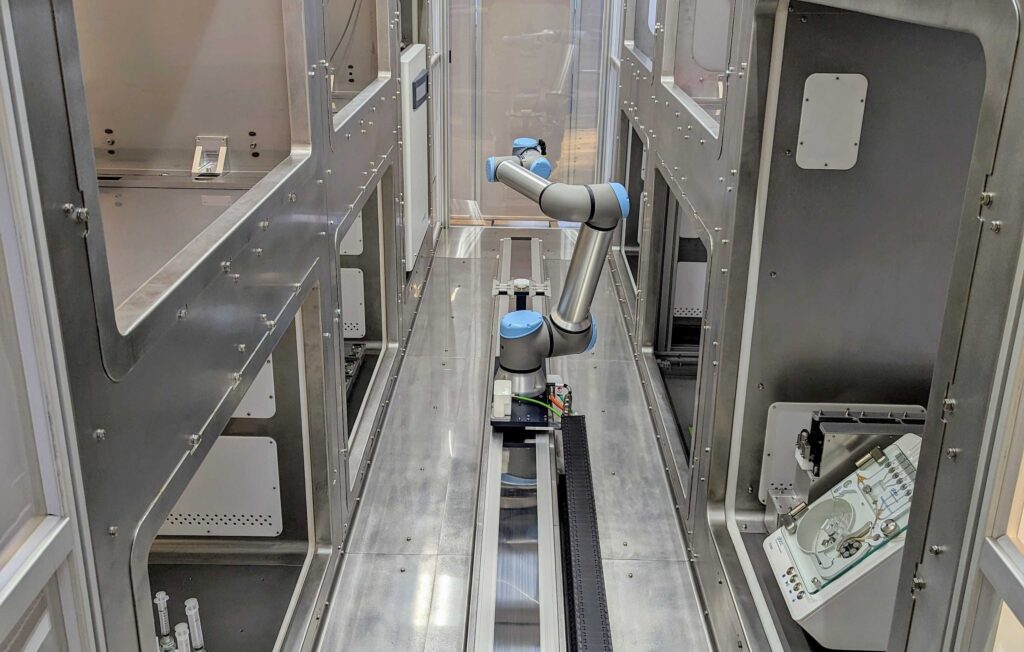Cell therapy manufacturing is a uniquely complex process in the pharmaceutical industry. It presents unique challenges over other pharmaceutical processes as it requires manufacturers to handle and store living cells.
One company, Multiply Labs, has created a system to overcome these challenges by using robots and RoboDK Software.
Using Multiply Labs’ innovative approach, automated cell therapy manufacturing has the potential to significantly reduce costs while ensuring statistically equivalent outcomes to manual processes in terms of cell yields, viability, and phenotype.
This new system could bring about a new era of producing this type of therapy, surpassing the previous time-consuming manual processes, and ultimately, supporting the scalability of cell therapies for patients in need.
Let’s look at how they used RoboDK to create the system.
What Is Cell Therapy Manufacturing
Cell therapy involves growing cells in a controlled environment. These are then placed into the body to replace damaged or diseased cells or modulate the function of the patient’s cells. This therapy is at the forefront of biomedical innovation, being used to treat cancer, autoimmune conditions, and various others.
The challenge with this type of manufacturing is the need to maintain strict purity, potency, and safety throughout the complex multi-stage production process. This involves cultivation of the cells, multiplication, and processing in a controlled environment.
Some of the unique challenges of cell therapy manufacturing include:
- High complexity of both materials and process.
- Tracking and testing of cell activity and safety.
- Need for customization with patient-specific manufacturing.
- Logistical challenges involved in handling live cells.
- Scaling these biological processes to be accessible.
The promises of cell therapy are huge… but only with a reliable process for producing the cells.
Introducing Multiply Labs…
This is where Multiply Labs comes in. The company originates from a shared passion for robotics among its founders, who met at MIT.
Based in San Francisco, California, Multiply Labs specializes in developing industry-leading automated manufacturing systems to produce individualized drugs. The team combines a unique blend of mechanical and electrical engineering, software development, and pharmaceutical science.
The company believes that robotics and automation have great potential for improving patient accessibility and unlocking the scalability of these cell therapy treatments. They aim to create flexible robotic systems that are compatible with the market-leading pharmaceutical manufacturing instruments, so that manufacturers do not need to significantly change their existing processes.
Their systems are modular and can operate in parallel. This allows them to achieve high throughput, as scalability is a core concern for many pharmaceutical manufacturers.
Fred Parietti, CEO and Co-Founder says:
At Multiply Labs, we are actively developing a cell therapy robotic system, which can operate market-leading GMP instruments already widely deployed for cell therapy manufacturing. This is part of our ongoing, company-wide quest to pioneer a fully automated, end-to-end process for cell therapy manufacturing. To bring this vision to life during the development process, we use renders to showcase what we’re building.
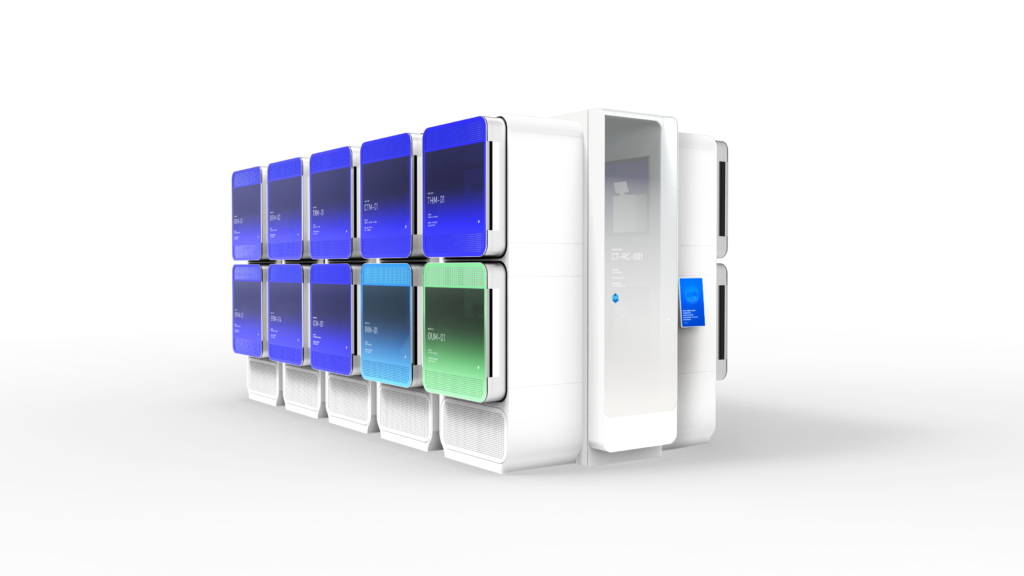
The Robotic System for Personalized T-Cells
One of the company’s latest developments is a robotic system for cell therapy manufacturing. The company recently released a peer reviewed study showing that a robotic cell expansion process can match the performance, and reduce the cost of a manual process.
The system leverages robotic modules, automating market-leading instruments currently leveraged for cell therapy manufacturing. Manufacturers have the flexibility to combine and mix and match robotic modules to best match their process, and they can drive high throughput via multiple parallel modules.
Multiply Labs tested the robotic system against a comparable manual process. They found that the results were statistically indistinguishable.
Fred Parietti, the company’s co-founder and CEO, says:
We are so excited by this initial data as it opens the door to accelerating the availability of cell therapies. This data demonstrates that manufacturers can confidently automate their existing processes for cell expansion, without making significant modifications to the process itself, effectively minimizing bioprocess and regulatory risks.
With more automation, the labor cost of cell therapy manufacturing can be lowered enough to make cell therapies accessible to many more people.
The Role of RoboDK
RoboDK was a key part of creating the company’s modular robotic system. The team used it for early research, simulation creation, debugging, rendering, and various other stages of their development.
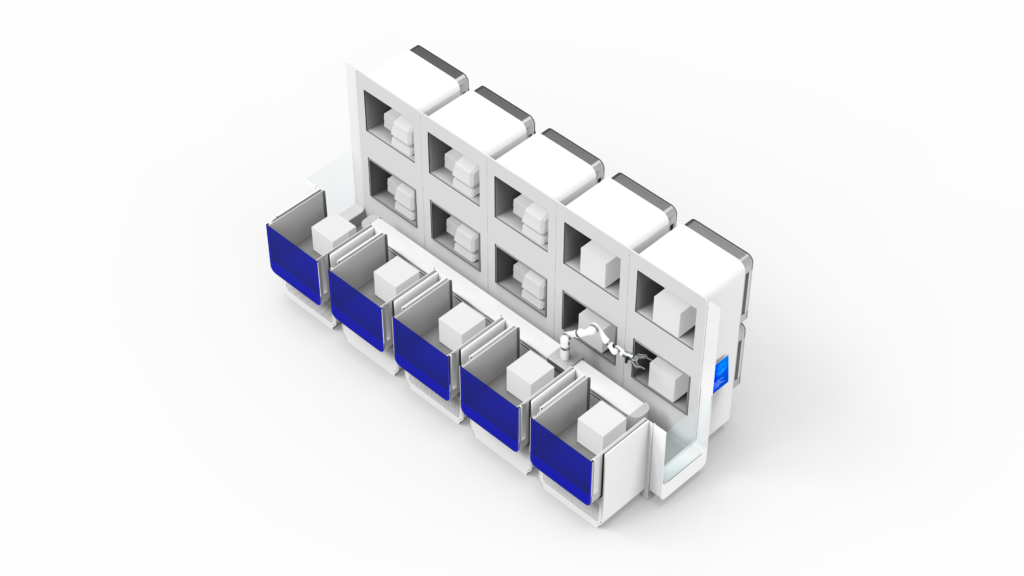
A unique aspect of how the team used RoboDK was in their rendering of the simulations, to demonstrate what Multiply Labs is trying to achieve before the physical prototype was ready.
Xiaojie Chen, robotics engineer at Multiply Labs, says:
We started using RoboDK in March 2023 and found it’s an excellent solution to help the team. The RoboDK team also rapidly solved the bugs we saw during the beta, so we are one of the first teams to use this function. The entire project was done incredibly fast, with several team members working closely.
5 Key Ways Multiply Labs Used RoboDK
RoboDK was instrumental in the team’s achievement at various stages of their development.
Here are 5 key ways the team used RoboDK:
- Early Research and Collision Prevention — The team first used RoboDK to conduct early research tests and ensure that there were no collisions between components.
- Creating Accurate Simulations — RoboDK’s ability to simulate very accurate motions was a critical factor to Multiply Labs using it.
- Rendering and Blender Export — The team wanted to create high-quality visual renderings of their simulations to demonstrate the prototype. For this, they created the models in CAD, ran the simulations in RoboDK, then exported into Blender using an Add-in for further rendering.
- Rapid Response to Feedback — One benefit to using RoboDK is that it allows smooth passing of models with other software packages. Its Blender Export function, for example, allowed the team to save a lot of time and get rapid feedback from the team.
- Education and Efficiency — The ease of learning was an essential aspect to Multiply Lab’s adoption of RoboDK. It allowed their engineers to focus on engineering rather than learning new software
Changing Pharmaceutical Manufacturing
Multiply Labs is passionate not only about robotics, but about creating a future where manufacturing of life-saving cell therapies is accessible, efficient, and reliable.
Currently, the development and manufacturing of cell therapies are exorbitantly expensive, hindering broad access to life-saving treatments. In fact, as much as 50% of manufacturing costs stem from labor-intensive manual processes and a lack of skilled workers. By employing Multiply Labs’ innovative approach, automated cell therapy manufacturing has the potential to significantly reduce costs while driving increased scalability.
What questions do you have about this? Tell us in the comments below or join the discussion on LinkedIn, Twitter, Facebook, Instagram, or in the RoboDK Forum.. Also, check out our extensive video collection and subscribe to the RoboDK YouTube Channel

